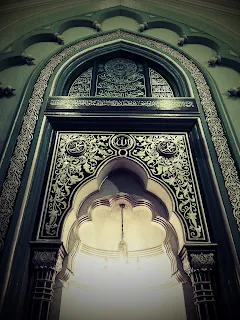 In his Friday Sermon of 08 September 2023~22
Safar 1445 AH, Imam- Jamaat Ul Sahih Al Islam International Hazrat Muhyiuddin
Al Khalifatullah Munir A. Azim (aba) of Mauritius gives a deep exposition on
giving in the way of God.
In his Friday Sermon of 08 September 2023~22
Safar 1445 AH, Imam- Jamaat Ul Sahih Al Islam International Hazrat Muhyiuddin
Al Khalifatullah Munir A. Azim (aba) of Mauritius gives a deep exposition on
giving in the way of God.
Sincerity of intention and action is the mark of true faith. A true believer remembers Allah (swt) with her heart; is in awe of God’s commandments and prescriptions all the time. One’s mind, body and wealth- all will testify to devotional religious practices in everyday life: recitation of the Holy Qur’an; regular performance of the prayer; spending one’s wealth and resources secretly and openly in service of God’s cause. A public act of giving can encourage others to do the same. A person should not to be boastful; Qur’an condemns hypocrisy and show off- ‘someone who spends his wealth only to be seen by people’ (2:265; 4:39). Indeed, the true spirit of giving in religion- whether publicly or privately, is seeking only the Face of God, the approval and pleasure of God in sheer gratefulness for all that He has entrusted one with in terms of wealth and resources in this world. ‘Those who give, out of their own possessions, by night and by day, in private and in public, will have their reward with their Lord: no fear for them, nor will they grieve’ (2:274)
Read the Friday Sermon Below:
'Those who recite the
Book of Allah, keep up the prayer, give secretly and openly from what We have
provided for them, may hope for a trade that will never decline.' (Surah Al-Fatir, 35: 30)
Here “from what We
have provided” does not just mean wealth, but also includes abilities,
skills and means. So Allah is talking about those who spend from what He has
provided them. They spend in secret too and openly too. Allah says that those
are people who have made a transaction which shall never perish; a business or
trade that will never fail. And its advantages will continue all the time. We
know that in the world there are many businesses that prosper and flourish and
develop but after a while, if not in the lifetime of a person, but in the lifetime
of his children, the business ends and is destroyed.
But here Allah mentions
such a business which never ends, never fails, i.e. a never-ending prosperous
business. In that subject too, like I explained before, I told you that [like
in this verse] spending in the path of Allah has been linked to other subjects.
Otherwise, the act to just spend in itself is without any importance. There are
people who sometimes give importance to people who have money and who can spend
and they don’t give any importance to a person who does not have any money and
who cannot spend.
In the Jamaat Ul Sahih
Al Islam, we do not make any difference between the rich and the poor. The
difference is in Taqwa only. If a poor person who is Muttaqi
gives a little something [to the Jamaat – in the way of Allah], then we honour
him for this financial sacrifice, even if it be little. There should not also
manifest the feeling and thought that if the rich are spending, then we should
not give them any importance. Importance should be given to both the rich and
the poor. They both are making efforts according to their means to give in the
path of Allah.





















